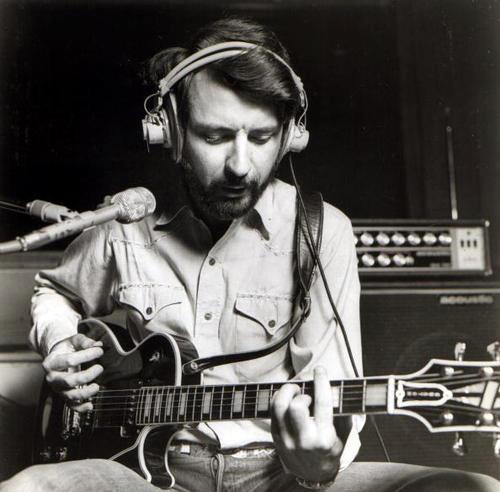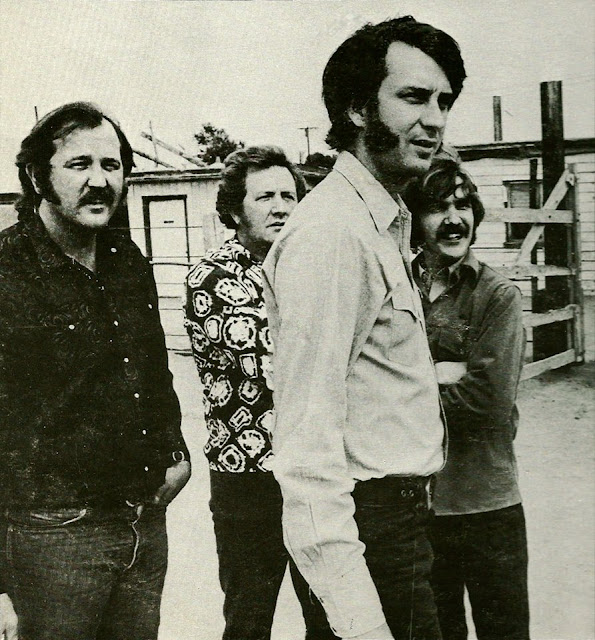June 30, 2013
June 26, 2013
June 25, 2013
June 23, 2013
June 19, 2013
June 16, 2013
UK Compilation from 1975 entitled "Silver Moon"
"Silver Moon" was the third FNB single. The song reached #42 on the U.S. charts and #13 in Canada. The quadraphonic 8-track tape release of "Loose Salute" features the full, extended version.
June 14, 2013
June 13, 2013
June 12, 2013
June 9, 2013
“What made Red truly great was just his touch, the subtlety of it. He understood you didn’t need to do much to make the instrument sing. Even with a flurry of strings, or those magical converging chords, he really didn’t work at it too hard, the instrument did a lot of the work. He just barely moved, but the sound was magical. The effort was like the effort of a hummingbird to fly.”
Michael Nesmith
Charlie Burton - Rolling Stone Magazine 4.15.1971
Mike Nesmith? Well, hang onto your wool hat cats and kitties, because this album is good.
Mike Nesmith, you will remember, was one of the plastic Beatles, the Monkees, who can still be seen on Saturday morning TV, somewhere between The Archies and Lancelot Link, Secret Chimp. Besides being a Monkee, Mike was a composer of some talents. "Different Drum" was strong enough to bear the weight of Linda Ronstadt's entire career, and (though I've never been completely sure), Mike is often credited as composer of "Mary, Mary," first recorded by Paul Butterfield.
Well, no Monkeeshines here. Loose Salute shows that Mike is firmly planted in country-rock territory with his group, the First National Band, which features Red Rhodes on steel guitar, one of the better technicians of the instrument. The production is flawless (remember when Frank Zappa said that Monkees albums were put together better than most San Francisco acid-rock records?), the music is nice to listen to, and the boys all play their own instruments.
The album features a beautiful "hit single" that never was played on the radio, "Silver Moon," a flashy rendition of Hank Cochran and Harlan Howard's classic, "I Fall to Pieces," a catchy rocker, "Dedicated Friend," and some pretty acoustic folk songs, "Conversations" and "Thanx For the Ride." "Listen to the Band," which features Red Rhodes, deserves to become a country and western standard, and the rest is good Hollywood cowboy music, fun to dance to, or eat enchiladas to.
Mike's straightforward, no-bullshit vocals are a welcome change from the usual Byrds-y, constipated singing style generally preferred by country hippie bands, and the nine Nesmith originals on Loose Salute radiate, if not genius, then a good, solid versatility. The flavor of the songs go from country to Latin ("Tengo Amore,") to big band ("Hello Lady").
I have never considered myself a real Monkees fan, but I think Loose Salute by Mike Nesmith and the First National Band is one of the hippest country-rock albums in some time, certainly the most listenable. Mike Nesmith? Well, why the hell not?
Charlie Burton/Rolling Stone Magazine 4.15.1971
"Loose Salute" review - Robert Christgau - Record Guide 1981
In which Nesmith continues his transmutation into Gram Parsons for television fans, or the Jimmie Rodgers of the Sunset Strip. I'm beginning to suspect that he takes his meandering thoughts and marble columns in the sky more seriously than they deserve. But his songwriting gifts are at a peak on this amalgam of gimmicks and mannerisms, long-vowel articles and near-yodels and electronic excursions and alien rhythms. At its best, sublime schlock; at its worst, downhome kitsch.
"Loose Salute" review/Robert Christgau/Record Guide 1981
John London 1970
London also played bass for other L.A.-based bands. In 1970, he and Nesmith, who had decided to leave the Monkees, formed a new group with pedal steel guitar ace Red Rhodes and drummer John Ware. Calling themselves the First National Band, the group signed with RCA Records. While praised for their country rock innovations, the band had little commercial success, and eventually broke up.
"Loose Salute" review - Jim Worbois - The All-Music Guide to Rock, 1995
With this record, Nesmith's momentum builds as this album is even better than the first. While the single from this album didn't do as well as his previous hit, it was a better song and kicks off the album nicely. Also, steel player extraordinaire, "Red" Rhodes, is beginning to take a more dominant role in the sound of the band. Of special interest are Nesmith's third go at recording "Listen to the Band," a fine cover of Patsy Cline's "I Fall to Pieces," and his renewed interest in Latin rhythms.
"Loose Salute" review/Jim Worbois/The All-Music Guide to Rock, 1995
"Loose Salute" review - Mark Deming - All Music
After reinventing himself as an engagingly spacey cowboy on the splendid Magnetic South, Michael Nesmith took a slightly more eclectic approach on his second album with the First National Band, Loose Salute. While country flavors still dominate the album (and Red Rhodes' pedal steel work was even stronger this time out), the up-tempo numbers swing a bit harder (especially the rollicking "Dedicated Friend"), there's a funky R&B undertow to "Bye, Bye, Bye," the rhythm guitars on "Silver Moon" suggest Nesmith had heard a bit of reggae, and "Tengo Amore" brings a Latin influence into the mix. But Nesmith's love of old-school country still rings clear on every cut (especially the steel-dominated remake of the Monkees' "Listen to the Band"), and after letting the world know about his deeper side on Magnetic South, Loose Salute found Nesmith writing about more direct and organic themes (love, faith, ditching work, leaving the Monkees). Nesmith also took over as producer, and he gets a tougher and tighter sound from the band than Felton Jarvis managed on Magnetic South. Loose Salute doesn't cohere quite as well as Magnetic South, but the material is strong, the band sounds great, and Michael Nesmith offered even more surprises than he had in his first turn at bat; it's one of the strongest records in his catalog as a solo artist.
"Loose Salute" review/Mark Deming/All Music
"Nevada Fighter" review - Mark Deming - All Music
Nevada Fighter kicks off with the witty and loose-limbed "The Grand Ennui," and for a moment it sounds like the album will pick up where Michael Nesmith's previous album with the First National Band, Loose Salute, left off. But before long, the album shifts gears, and it becomes obvious that Nesmith had something different in mind this time. Except for the rollicking side-closer, "Nevada Fighter," most of the material on side one suggests the more introspective moments of Magnetic South but without the same balance of charm and dry humor that made that album so appealing (though "Propinquity (I've Just Begun to Care)" is a fine love song that's a good bit more approachable than its title would lead you to expect). Side two is turned over to material by other songwriters, and while this shifts the album's lyrical tone rather dramatically, Nesmith reveals himself to be a fine interpretive vocalist, and "Texas Morning" and "The Rainmaker" are splendid songs that would merit anyone's attention. the First National Band were also augmented by a number of session musicians on Nevada Fighter (including James Burton and Ronn Tutt from Elvis Presley's band), and the arrangements have a decidedly different flavor than on Nesmith's previous two albums, especially in the second half (though Red Rhodes' pedal steel is predictably splendid throughout). Nevada Fighter is a fine album, but it's also the weakest of the three Nesmith would cut with the First National Band, and it's not hard to imagine that Nesmith was starting to look for new pastures while he was recording this set.
"Nevada Fighter" review/Mark Deming/All Music
"Magnetic South" review - Mark Deming - All Music
Anyone who'd been listening closely to the songs Michael Nesmith wrote while a member of the Monkees (or heard his hard to find 1968 solo debut for Dot) already knew that Nesmith had a soft spot for country music. But when Nesmith left the pre-Fab Four to form the First National Band, he dove head first into the twangy stuff, and if he wasn't the first guy to merge country and rock (Gram Parsons easily beat him to the punch on that), he was certainly doing it well before country-rock became the next big thing, and Magnetic South made it clear he had his own distinct way of bringing the two genres together. Nesmith put together a top-flight band who sound at once relaxed and thoroughly committed, whether easing through a laid-back number like "Joanne" or kicking up some dust on "Mama Nantucket"; O.J. "Red" Rhodes' pedal steel work is superb throughout, while bassist John London and drummer John Ware offer strong, unobtrusive support (the great Earl P. Hall also sits in on piano). And though the phrase "cosmic cowboy" wasn't coined for Nesmith, it could have been; here, he indulges himself in a consciously poetic and philosophical lyrical style that's a good bit more abstract than one would expect from a former Monkee, though Nesmith's dry sense of humor is always lurking around the corner, ready to rescue him when he slips too deep into pretension. Mixing a country sound with a rocker's instincts and blending airy thoughts on the nature of life and love with iconography of life in the West that brought together the old and the new, Michael Nesmith reveled in contradictions on Magnetic South, making them sound as comfortable as well-worn cowboy boots and as fun as a Saturday night barn dance. It's a minor masterpiece of country-rock, and while the Eagles may have sold more records, Nesmith yodels a hell of a lot better than any of them.
"Magnetic South" review/Mark Deming/All Music
Subscribe to:
Posts (Atom)











































